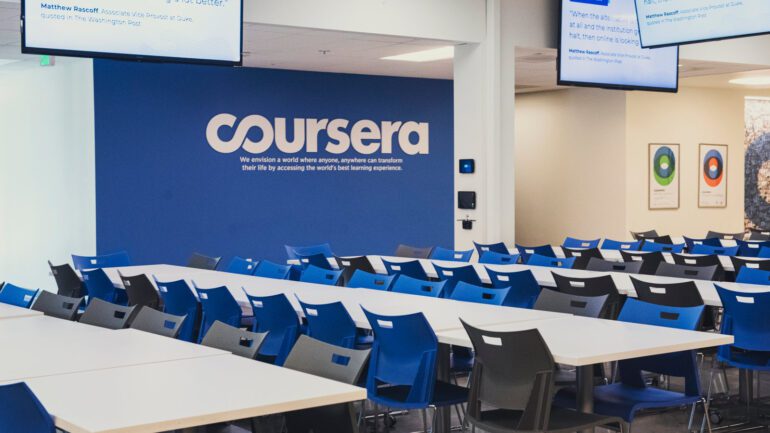TL;DR:
- Coursera introduces GenAI Academy to empower employees and leaders in leveraging AI for productivity.
- It offers foundational courses for everyday AI users and executive education for leaders.
- Partnerships with DeepLearning.AI, Stanford Online, AWS, and others strengthen course content.
- Coursera aims to bridge the AI knowledge gap and facilitate hands-on practice.
- GenAI Academy addresses the need for strategic and ethical AI decision-making by executives.
- A United Nations study highlights the augmenting effect of generative AI on jobs.
- Microsoft’s Work Trend Index emphasizes the need for employees to acquire new AI-related skills.
- HR experts predict increased demand for AI skill development in the workforce.
Main AI News:
In a dynamic move, Coursera, the renowned online learning platform, unveiled its latest endeavor aimed at empowering businesses to harness the full potential of artificial intelligence (AI) to achieve peak productivity. The newly launched GenAI Academy is strategically designed to cater to both employees and leaders, equipping them with the essential tools and knowledge required to leverage AI effectively in the workplace.
This comprehensive initiative comprises foundational courses tailored for the everyday generative AI user, along with an entire executive education track meticulously curated for organizational leaders. Coursera has forged strategic partnerships with industry giants such as DeepLearning.AI, Stanford Online, AWS, Vanderbilt University, and Google to design and deliver these courses.
Trena Minudri, Chief Learning Officer at Coursera, highlighted the driving force behind GenAI Academy’s inception, stating, “[We] started to hear from our clients and our learners that there was a big need for understanding this [AI] space. Lots of talk, lots of hype, but how do I do it?” Recognizing their forte in providing trusted content sourced from the world’s top universities and industry partners, Coursera aspired to meet this need effectively.
Minudri emphasized that Coursera’s collaboration with partners aims to create content that addresses various facets of AI utilization, including essential aspects like prompt engineering basics. The overarching goal is to cultivate a holistic understanding among all employees, covering gen AI core principles, practical applications, innovations, and the impact on daily job roles. Guided projects are an integral part of the curriculum to facilitate hands-on practice, ensuring a secure learning environment for skill development.
GenAI Academy’s Executive Education track is specifically tailored to assist company leaders in making strategic and ethical decisions concerning generative AI. Coursera has ambitious plans to roll out additional courses and role-based learning programs in the forthcoming months, solidifying its commitment to AI education.
A recent study conducted by the United Nations International Labor Organization concluded that generative AI is more likely to augment existing job roles rather than replace them. This realization underscores the necessity for employees to acquire familiarity and proficiency in utilizing AI tools.
Trena Minudri voiced a crucial concern, stating, “One of the first risks is people getting left behind. The fear is that as other people are adopting gen AI and they’re getting better at it and they’re improving their work and becoming so much more productive by using it, that population is going to get left behind.”
Microsoft’s Work Trend Index report on AI, released in May, revealed that 82% of business leaders anticipate the need for their employees to acquire new skills to adapt to the growing influence of AI in the workplace.
As the year progresses, the prominence of generative AI in the corporate landscape is set to soar. Human resources professionals predict an increased demand for Learning and Development (L&D) teams to create innovative ways to foster the development and upskilling of employees in utilizing rapidly evolving AI technology effectively.
Minudri emphasized that acquiring AI skills is not solely the responsibility of the L&D department but should be viewed as an organization-wide opportunity. She stated, “The last thing [any] CEO wants to do is send it over to the CLO and say this is a learning initiative because it won’t work. This is an overall company initiative [with] learning as a crucial component.”
Conclusion:
Coursera’s GenAI Academy represents a strategic move to address the increasing demand for AI skills in the business world. By offering comprehensive courses for both employees and leaders and partnering with industry giants, Coursera is well-positioned to meet the growing need for AI proficiency. This initiative aligns with the market trend of AI integration in workplaces and the importance of upskilling employees to stay competitive in the evolving job landscape.

